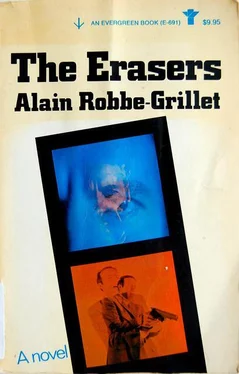Alain Robbe-Grillet - The Erasers
Здесь есть возможность читать онлайн «Alain Robbe-Grillet - The Erasers» весь текст электронной книги совершенно бесплатно (целиком полную версию без сокращений). В некоторых случаях можно слушать аудио, скачать через торрент в формате fb2 и присутствует краткое содержание. Жанр: Криминальный детектив, на английском языке. Описание произведения, (предисловие) а так же отзывы посетителей доступны на портале библиотеки ЛибКат.
- Название:The Erasers
- Автор:
- Жанр:
- Год:неизвестен
- ISBN:нет данных
- Рейтинг книги:4 / 5. Голосов: 1
-
Избранное:Добавить в избранное
- Отзывы:
-
Ваша оценка:
- 80
- 1
- 2
- 3
- 4
- 5
The Erasers: краткое содержание, описание и аннотация
Предлагаем к чтению аннотацию, описание, краткое содержание или предисловие (зависит от того, что написал сам автор книги «The Erasers»). Если вы не нашли необходимую информацию о книге — напишите в комментариях, мы постараемся отыскать её.
The Erasers — читать онлайн бесплатно полную книгу (весь текст) целиком
Ниже представлен текст книги, разбитый по страницам. Система сохранения места последней прочитанной страницы, позволяет с удобством читать онлайн бесплатно книгу «The Erasers», без необходимости каждый раз заново искать на чём Вы остановились. Поставьте закладку, и сможете в любой момент перейти на страницу, на которой закончили чтение.
Интервал:
Закладка:
“Third, he was certainly recognized by the professor; the latter claimed to have been attacked before even having had time to open the door all the way, thereby explaining that he didn’t see his murderer’s face; actually, he went into the study and spoke to the two men: there was even a struggle between them, as is indicated by the disorder of the room (piles of books knocked over, chair moved, etc.) and the fingerprints (number 3) on the paperweight.
“Fourth, the motive of the crime is not theft: someone who knew the house so well would also know that there was nothing to steal in this room.
“Dupont was unwilling to reveal his murderer, for the latter was too closely involved with him. He even concealed as long as possible the seriousness of his wound, hoping that his friend Doctor Juard would take care of him, and that scandal would be avoided. It is for this reason that the housekeeper believed Dupont had only received a ‘flesh wound in the arm? “
And the whole scene is reconstructed. The young man, after having vainly appealed to his rights, to filial love, to pity, and finally to blackmail, determined, as a last resort to attempt force. Since he is a weakling and afraid of his father, he has sought the services of a friend, stronger and older than himself, whom he will introduce as his attorney but who is actually his thug. They have decided to make their visit on Monday, October 26, at seven-thirty in the evening…
Daniel Dupont reaches the study door, his eyes on the floor, his hand already stretched toward the doorknob that he is preparing to turn, when he is suddenly struck by this thought: “Jean is here waiting for me!” The professor stops and holds his breath. Perhaps Jean has not come alone: didn’t he threaten him, the other day, with bringing his “lawyer” with him? Who knows what today’s children are capable of?
Cautiously he turns around and tiptoes into the bedroom to get the revolver he has kept, since the war, in the drawer of his night table. But just as he is slipping off the safety catch, he feels a sudden qualm: he is not going to fire at his own son, after all; it’s only to frighten him.
Back in the hallway, the weight of the revolver in his hand seems unrelated to the fear that ran through him a minute earlier; by comparison this sudden fear vanishes altogether: why should his son have come tonight? Moreover, Dupont is not afraid of him. He puts the gun in his pocket. Starting tomorrow, he will have the house doors locked at nightfall.
He turns the doorknob and opens the study door. Jean is there waiting for him.
He is standing between the chair and the desk. He has been reading the papers there. Another man is standing in front of the bookcase, to one side, his hands in his pockets-obviously a bad type.
“Good evening,” Jean says.
His eyes are bright, both arrogant and apprehensive; he must have been drinking again. His mouth grimaces in a parody of a smile.
“What are you doing here?” Dupont asks coldly.
“I came to talk to you,” Jean says. “That’s (gesture of his chin) Maurice…he’s my attorney (another grimace).”
“Good evening,” Maurice says.
“Who let you in?”
“No one,” Jean says. “I know the house.”
Which means: “I’m a member of the family!”
“Well, you can leave the way you came,” the professor says calmly. “It’s just as easy: you know the way.”
“We’re not leaving just yet,” Jean says; “we came to talk-to talk business.”
“We’ve already exhausted the subject, my boy. Now you’re going to leave.”
Dupont walks toward his son with a determined expression; he sees the boy’s eyes fill with fear…fear and hatred…He repeats:
“You’re going to leave.”
Jean picks up the first thing he finds within his reach: the heavy paperweight with sharp edges. He brandishes it, ready to strike. Dupont steps back and puts his hand on his revolver.
But Maurice has seen the gesture and is already in front of Dupont, quicker to take aim himself:
“Let go of that and take your hand out of your pocket.”
After that no one speaks. With his dignity at stake, Dupont feels that he cannot obey this contemptuous treatment in front of his son.
“The police are coming,” he says. “I knew you’d be here waiting for me. Before coming in I telephoned from the bedroom.”
“The cops?” Maurice says. “I don’t hear anything.”
“It won’t be long, don’t worry.”
“We have time enough to get things straight!”
“They’ll be here any minute.”
“The telephone’s been cut for two days,” Jean says.
This time, Dupont’s anger is too much for him. Everything happens in a flash: the professor’s sudden movement to take out his gun, the shot that hits him full in the chest, and the young man’s shrill cry:
“Don’t shoot, Maurice!”
4
But the chief does not seem convinced. He dares not reject his assistant’s hypothesis out of hand, for you never know: suppose that happened to be what happened, what would he look like then? Then too, the obscurities and contradictions of the case have to be interpreted one way or another… What bothers him about this theory is that it involves-accuses, actually-people too highly placed, whom it can only be dangerous to affront-whether they are innocent or guilty. He says:
“We aren’t accustomed here…we aren’t accustomed in the
Executive Information Service to work on suspicions as vague as that “
He would like to add, by the way, some nasty joke about the Bureau of Investigation, and the “great Fabius,” but he decides to restrain himself: this may not be the right moment.
In the hope of discouraging his assistant, at least temporarily, from the slippery path onto which the latter wants to lure him, he proposes to send him on an assignment to the scene of the crime: there he could deal with the local police functionaries and with the doctor who has received Professor Dupont’s testimony along with his last breath; he could also discover whether the victim’s residence furnishes any new clue; he could…But the assistant shakes his head. It is quite futile for him to waste his time in that gloomy provincial town, half asleep in the North Sea fog. He would find nothing there, absolutely nothing. It is here, in the capital, that the drama has been acted…that the drama is being acted.
“He thinks I’m afraid,” the chief realizes; but he doesn’t care. He says, quite casually:
“Sometimes you go through hell and high water to find a murderer…”
“…far away,” his assistant continues, “when all you need to do is stretch out your hand.”
“Don’t forget that the crime took place up there, even so…”
“It took place up there the way it could have taken place and, as a matter of fact, as it takes place anywhere, very day, now here, now there. What actually happened in Professor Dupont’s house the evening of October twenty-sixth? A replica, a copy, a simple reproduction of an event whose original and whose key are elsewhere. And tonight, once again, as every evening…”
“That’s still no reason for neglecting whatever clues we could find up there.”
“What would I find up there, if I went? Nothing but reflections, shadows, ghosts. And tonight, once again…”
Tonight a new copy will be discreetly slipped under the door, a correct copy duly signed and notarized, with just what it needs in the way of misspellings and misplaced commas so that the blind, the cowardly, the stone deaf can go on waiting and reassuring each other: “It can’t be really the same thing, can it?”
To try to persuade his chief, the assistant goes on:
“We’re not the only ones concerned with this case. If we don’t act fast enough, we run the risk of finding another service pulling the rug out from under us…maybe the great Fabius himself, who will pass himself off as his country’s savior once again…and get us all arrested, if he finds out we knew the truth and concealed it…You’ll be accused” of complicity, you can be sure of that.”
Читать дальшеИнтервал:
Закладка:
Похожие книги на «The Erasers»
Представляем Вашему вниманию похожие книги на «The Erasers» списком для выбора. Мы отобрали схожую по названию и смыслу литературу в надежде предоставить читателям больше вариантов отыскать новые, интересные, ещё непрочитанные произведения.
Обсуждение, отзывы о книге «The Erasers» и просто собственные мнения читателей. Оставьте ваши комментарии, напишите, что Вы думаете о произведении, его смысле или главных героях. Укажите что конкретно понравилось, а что нет, и почему Вы так считаете.












